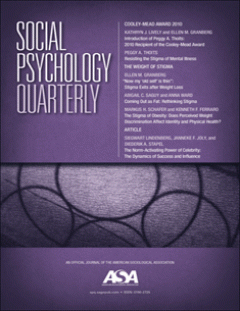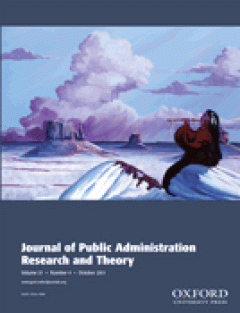Filter by

The Moral Self : Applying Identity Theory
This research applies identity theory to understand the moral self. In identity theory, individuals act on the basis of their identity meanings, and they regulate the meanings of their behavior so that those meanings are consistent with their identity meanings. An inconsistency produces negative emotions and motivates individuals to behave differently to produce outcomes that will better match …
- Edition
- Vol. 74 no. 2, June 2011.pp. 192-215
- ISBN/ISSN
- 01902725
- Collation
- -
- Series Title
- Social Psychology Quarterly
- Call Number
- -

Designing the Recipient : Managing Advice Resistance in Institutional Settings
In this paper we consider a collection of conversational practices that arise when a professional is faced with extended resistance to their offered advice. Our data is comprised of telephone calls to a UK child protection helpline. The practices we identify occur repeatedly across our corpus of advice resistance sequences and involve (1) the repackaging of resisted advice in more idiomatic for…
- Edition
- Vol. 74 no. 2, June 2011.pp. 216-241
- ISBN/ISSN
- 01902725
- Collation
- -
- Series Title
- Social Psychology Quarterly
- Call Number
- -

Playing the (Sexual) Field : The Interactional Basis of Systems of Sexual Str…
Recently, scholars have used a Bourdieusian theory of practice to analyze systems of sexual stratification, including an examination of sexual fields and sexual (or erotic) capital. While the broad structural features of the sexual field have been a point of focus in this latter research, a systematic analysis of the interactional processes that operate within the sexual status order has not be…
- Edition
- Vol. 74 no. 3, September 2011.pp. 244-266
- ISBN/ISSN
- 01902725
- Collation
- -
- Series Title
- Social Psychology Quarterly
- Call Number
- -

Do Others’ Views of Us Transfer to New Groups and Tasks? : An Expectation S…
The dual nature of the self has been a core concern of social psychology since its inception. We contribute to this longstanding tradition of inquiry by focusing on two lines of research within the expectation states theoretical research program: (1) the study of second-order expectations and (2) research on the durability of expectations. We argue that individuals give priority to others� expe…
- Edition
- Vol. 74 no. 3, September 2011.pp. 267-290
- ISBN/ISSN
- 01902725
- Collation
- -
- Series Title
- Social Psychology Quarterly
- Call Number
- -

Spoiled Group Identities and Backstage Work : A Theory of Stigma Management R…
How do persons with a stigmatized identity learn potential responses to discrimination and harassment? Drawing on three and a half years of ethnographic data, this paper demonstrates how members of a group of Muslim American youth are socialized in locally dominant stigma management strategies through stigma management rehearsals. Stigma management rehearsals are small group interactions throug…
- Edition
- Vol. 74 no. 3, September 2011.pp. 291-309
- ISBN/ISSN
- 01902725
- Collation
- -
- Series Title
- Social Psychology Quarterly
- Call Number
- -

Being in “Bad” Company : Power Dependence and Status in Adolescent Suscep…
Theories of susceptibility to peer influence have centered on the idea that lower status adolescents are likely to adopt the behaviors of high status adolescents. While status is important, social exchange theorists have shown the value of analyzing exchange relations between actors to understand differences in power. To build on status-based theories of peer influence, this study analyzes powe…
- Edition
- Vol. 74 no. 3, September 2011.pp. 310-332
- ISBN/ISSN
- 01902725
- Collation
- -
- Series Title
- Social Psychology Quarterly
- Call Number
- -

“We Want Them to Be as Heterosexual as Possible” : Fathers Talk about The…
This article examines heterosexual fathers� descriptions of conversations with their teen children about sexuality and their perceptions of their teen children�s sexual identities. We show that fathers construct their own identities as masculine and heterosexual in the context of these conversations and prefer that their children, especially sons, are heterosexual. Specifically, fathers feel ac…
- Edition
- Vol. 25 no. 3, June 2011.pp. 293-315
- ISBN/ISSN
- 08912432
- Collation
- -
- Series Title
- Gender & Society
- Call Number
- -

“I’m Not a Victim, She’s an Abuser” : Masculinity, Victimization, and…
Previous research analyzing masculinity and domestic violence has focused on men�s accounts of the violence they have committed; relatively little research has focused on men�s accounts of victimization. This article critically examines how men negotiate the competing discourses of victimization, hegemonic masculinity, and stereotypes about domestic violence when filing for a domestic violence …
- Edition
- Vol. 25 no. 3, June 2011.pp. 316-334
- ISBN/ISSN
- 08912432
- Collation
- -
- Series Title
- Gender & Society
- Call Number
- -

“Locas,” Respect, and Masculinity : Gender Conformity in Migrant Puerto R…
In this article, I explore how masculinity and gender nonconformity are viewed by 37 migrant Puerto Rican gay men who had been raised in Puerto Rico and migrated Stateside as adults. Most of these migrant men note the importance of masculinity in their development and interactions with others, particularly other men. They resist identification of themselves as effeminate and distance themselves…
- Edition
- Vol. 25 no. 3, June 2011.pp. 335-354
- ISBN/ISSN
- 08912432
- Collation
- -
- Series Title
- Gender & Society
- Call Number
- -

A “Major Career Woman”? : How Women Develop Early Expectations about Work
Using data from 80 in-depth qualitative interviews with women randomly sampled from New York City, I ask: how do women develop expectations about their future workforce participation? Using an intersectional approach, I find that women�s expectations about workforce participation stem from gendered, classed, and raced ideas of who works full-time. Socioeconomic status, race, gender, and sexuali…
- Edition
- Vol. 25 no. 4, August 2011.pp. 409-430
- ISBN/ISSN
- 08912432
- Collation
- -
- Series Title
- Gender & Society
- Call Number
- -

“It’s the Knowledge That Puts You in Control” : The Embodied Labor of G…
Studies have recently begun to attend to the ways paid labor is embodied. However, the literature on embodied labor has not adequately addressed occupations for which the site of labor is the worker�s own body. One such occupation is that of gynecological educators�female-bodied instructors who teach breast and pelvic examinations to medical students using their own bodies as models. Drawing on…
- Edition
- Vol. 25 no. 4, August 2011.pp. 431-450
- ISBN/ISSN
- 08912432
- Collation
- -
- Series Title
- Gender & Society
- Call Number
- -

Dreaded “Otherness” : Heteronormative Patrolling in Women’s Body Hair R…
- Edition
- Vol. 25 no. 4, August 2011.pp. 451-472
- ISBN/ISSN
- 08912432
- Collation
- -
- Series Title
- Gender & Society
- Call Number
- -
- Edition
- Vol. 25 no. 4, August 2011.pp. 451-472
- ISBN/ISSN
- 08912432
- Collation
- -
- Series Title
- Gender & Society
- Call Number
- -

Constructing Arab Female Leadership Lessons from the Moroccan Media
How the Arab media construct Middle Eastern women as political actors, frame their leadership roles, and narrate their activities to the public are important questions largely ignored in the growing scholarship on women�s political participation in the Middle East and North Africa (MENA). Drawing on Nancy Fraser�s reflections on the politics of recognition and distribution (2007), I examine the…
- Edition
- Vol. 25 no. 4, August 2011.pp. 473-495
- ISBN/ISSN
- 08912432
- Collation
- -
- Series Title
- Gender & Society
- Call Number
- -

Men Bring Condoms, Women Take Pills : Men’s and Women’s Roles in Contrace…
The most popular form of reversible contraception in the United States is the female-controlled hormonal birth control pill. Consequently, scholars and lay people have typically assumed that women take primary responsibility for contraceptive decision making in relationships. Although many studies have shown that men exert strong influence in couple�s contraceptive decisions in developing count…
- Edition
- Vol. 25 no. 4, August 2011.pp. 496-521
- ISBN/ISSN
- 08912432
- Collation
- -
- Series Title
- Gender & Society
- Call Number
- -

Casual Hookups to Formal Dates : Refining the Boundaries of the Sexual Double…
�Hooking up,� a popular type of sexual behavior among college students, has become a pathway to dating relationships. Based on open-ended narratives written by 273 undergraduates, we analyze how students interpreted a vignette describing a heterosexual hookup followed by a sexless first date. In contrast to the sexual script which holds that women want relationships more than sex and men care a…
- Edition
- Vol. 25 no. 5, October 2011.pp. 545-568
- ISBN/ISSN
- 08912432
- Collation
- -
- Series Title
- Gender & Society
- Call Number
- -

Show or Tell? Feminist Dilemmas and Implicit Feminism at Girls’ Rock Camp
Previous research demonstrates how activists who do not identify as feminist sometimes engage in �implicitly feminist practices.� In this paper, I extend this research by asking: Do self-identified feminists also employ such implicit strategies in the course of their activist efforts? If so, why would they �do� feminism implicitly? Based on participant observation and semistructured interviews …
- Edition
- Vol. 25 no. 5, October 2011.pp. 569-588
- ISBN/ISSN
- 08912432
- Collation
- -
- Series Title
- Gender & Society
- Call Number
- -

Programs for Undergraduate Women in Science and Engineering : Issues, Problem…
We analyze programs for undergraduate women in science and engineering as strategic research sites in the study of disparities between women and men in scientific fields within higher education. Based on responses to a survey of the directors of the universe of these programs in the United States, the findings reveal key patterns in the programs� (1) definitions of the issues of women in scienc…
- Edition
- Vol. 25 no. 5, October 2011.pp. 589-615
- ISBN/ISSN
- 08912432
- Collation
- -
- Series Title
- Gender & Society
- Call Number
- -

Youth Privilege : Doing Age and Gender in Russia’s Single-Mother Families
Relative to gender, race, and class, age relations are undertheorized. Yet age, like gender, is routinely accomplished in daily life. Grandmothers and adult daughters simultaneously do age and gender as they support one another in managing paid work and domestic responsibilities. Drawing on ethnographic data and interviews with 90 single mothers and 30 grandmothers (babushki) in Russia, I explo…
- Edition
- Vol. 25 no. 5, October 2011.pp. 616-641
- ISBN/ISSN
- 08912432
- Collation
- -
- Series Title
- Gender & Society
- Call Number
- -

Stay-at-Home Fathers and Breadwinning Mothers : Gender, Couple Dynamics, and …
I examine experiences of married couples to better understand whether economic shifts that push couples into gender-atypical work/family arrangements influence gender inequality. I draw on in-depth interviews conducted in 2008 with stay-at-home husbands and their wives in 21 married-couple families with children (42 individual interviews). I find that the decision to have a father stay home is …
- Edition
- Vol. 25 no. 5, October 2011.pp. 642-664
- ISBN/ISSN
- 08912432
- Collation
- -
- Series Title
- Gender & Society
- Call Number
- -

Structural Embeddedness of Political Top Executives as Explanation of Policy …
This study examines structural embeddedness of political executives as an antecedent of policy isomorphism in municipalities. Surprisingly, little public management research investigates the institutional and structural backgrounds for decision making and action. This article argues that the social network of political executives constitutes a conduit in which information as well as expectation…
- Edition
- Vol. 21, Number 4, 2011.pp. 573-599
- ISBN/ISSN
- 10531858
- Collation
- -
- Series Title
- Journal of Public Administration Research and Theory
- Call Number
- -
 Computer Science, Information & General Works
Computer Science, Information & General Works  Philosophy & Psychology
Philosophy & Psychology  Religion
Religion  Social Sciences
Social Sciences  Language
Language  Pure Science
Pure Science  Applied Sciences
Applied Sciences  Art & Recreation
Art & Recreation  Literature
Literature  History & Geography
History & Geography